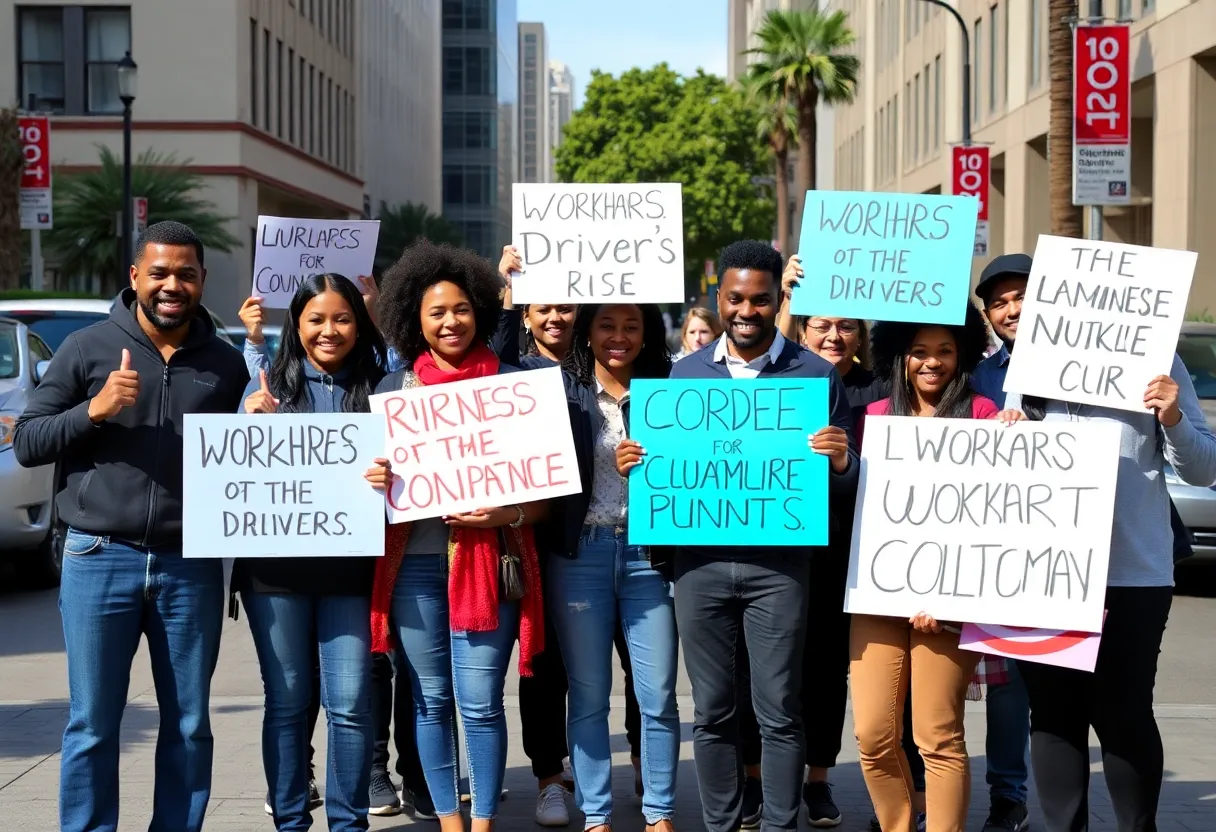California, August 30, 2025
News Summary
California has achieved a historic agreement allowing Uber and Lyft drivers to unionize and collectively bargain. Supported by Governor Gavin Newsom, this initiative includes new legislation, AB 1340 and SB 371, aimed at enhancing driver rights and reducing insurance costs. This agreement impacts around 800,000 drivers, representing the largest expansion of private sector collective bargaining in state history. However, it maintains drivers’ classification as independent contractors, as set by Proposition 22 in 2020, leaving some concerns regarding broader gig worker protections.
California has reached a historic agreement between Uber Technologies Inc. and Lyft Inc. that will allow drivers to unionize under a state-supervised model and collectively bargain for their rights and benefits. This landmark initiative signals a major shift in the ongoing dispute between labor unions and tech companies regarding the rights and roles of independent contractors in the gig economy.
The deal, which is supported by California Governor Gavin Newsom and legislative leaders, includes the passage of Assembly Bill 1340 (AB 1340) aimed at facilitating driver bargaining rights, as well as Senate Bill 371 (SB 371), which reduces uninsured motorist insurance requirements for ridesharing companies. This arrangement provides relief to Uber and Lyft by significantly lowering their insurance costs, which previously consumed up to 45% of fares in areas like Los Angeles, making rideshare services more affordable for passengers.
Approximately 800,000 drivers in California will benefit from the new framework that allows them to organize effectively. This agreement is considered the largest expansion of private sector collective bargaining in California’s history, according to the Service Employees International Union (SEIU), which sponsored AB 1340. The legislation empowers drivers to negotiate pay, job protections, and other benefits outside federal agency supervision. However, it is important to note that AB 1340 does not alter drivers’ classification as independent contractors that was solidified by Proposition 22 in 2020.
Under the new law, drivers can exercise their legal right to choose a union through a petition process that requires signatures from at least 10% of active drivers. Additionally, the proposed insurance reforms will lower the uninsured motorist coverage requirement from $1 million to $60,000 per driver, and $300,000 per accident, making it a more cost-effective arrangement for rideshare companies. Despite the potential benefits, experts remain wary about whether this new pathway to unionization will lead to significant improvements for workers.
The legislation comes amidst ongoing disputes regarding ride-hail drivers’ classification, compensation, and job protections. Courts and legislative bodies continue to address these issues while the new bargaining framework seeks to provide a more structured means for drivers to voice their concerns and negotiate their rights. However, the agreement does not extend to other gig workers, such as those delivering food through services like DoorDash, leaving some advocates calling for broader protections for all gig workers.
Although the deal presents opportunities for improved driver representation, critics have highlighted that certain essential protections were excluded from the final legislation. These include the right to strike and demands for employer-provided data on wages, which could hinder the effectiveness of the new bargaining system. Nevertheless, many activist drivers hold hope that this new model will empower them with a more substantial voice and better mechanisms to tackle their grievances.
The legislative support is expected to expedite the proposed bills through the California legislature by mid-September, potentially setting a precedent for similar agreements in other states as the conversation surrounding gig worker rights continues to evolve.
FAQ Section
What is the new agreement between Uber and Lyft?
The agreement allows California drivers to unionize and collectively bargain under a state-supervised model through legislative measures.
What are the main components of the legislation?
The legislation consists of Assembly Bill 1340, which provides bargaining rights to drivers, and Senate Bill 371, which reduces uninsured motorist insurance requirements.
How many drivers will be affected by this agreement?
Approximately 800,000 drivers in California will be given the structure to organize and negotiate under the new legislation.
What changes does the insurance reform propose?
The reform lowers the uninsured motorist coverage from $1 million to $60,000 per rideshare driver, in addition to $300,000 per accident.
Does this agreement change drivers’ independent contractor status?
No, the legislation does not alter the legal status of gig drivers as independent contractors, which was confirmed by Proposition 22 in 2020.
Key Features of the Agreement
| Feature | Details |
|---|---|
| Driver Unionization | Allows drivers to unionize and collectively bargain. |
| Legislation | Includes Assembly Bill 1340 and Senate Bill 371. |
| Impact | Affects approximately 800,000 drivers. |
| Insurance Changes | Reduces uninsured motorist coverage from $1 million to $60,000. |
| Independent Contractor Status | Does not change current legal status established by Proposition 22. |
Deeper Dive: News & Info About This Topic
- Los Angeles Times
- Politico
- TechCrunch
- Google Search: Unionization of Gig Workers
- Wikipedia: Gig Economy

Author: STAFF HERE CORONADO
The Coronado Staff Writer represents the experienced team at HERECoronado.com, your go-to source for actionable local news and information in Coronado, San Diego County, and beyond. Specializing in "news you can use," we cover essential topics like product reviews for personal and business needs, local business directories, politics, real estate trends, neighborhood insights, and state news affecting the area—with deep expertise drawn from years of dedicated reporting and strong community input, including local press releases and business updates. We deliver top reporting on high-value events such as the Coronado Island Film Festival, productions at Lamb’s Players Theatre, community workshops at John D. Spreckels Center, and iconic celebrations at Hotel del Coronado. Our coverage extends to key organizations like the Coronado Chamber of Commerce and Visit Coronado, plus leading businesses in hospitality, dining, and tourism that drive the local economy. As part of the broader HERE network, including HERESanDiego.com, HEREHuntingtonBeach.com, HERELongBeach.com, and HERELosAngeles.com, we provide comprehensive, credible insights into Southern California's dynamic landscape.





